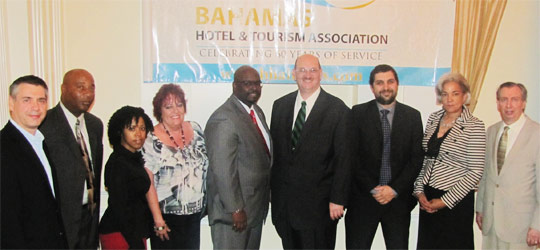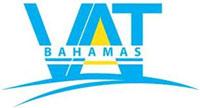
Hoteliers from throughout The Bahamas recently attended a luncheon launch of the Caribbean Hotel Energy Efficiency and Renewable Energy Action- Advanced Program (CHENACT -AP) at the British Colonial Hilton Hotel in Nassau to learn about the program and how they can participate.
The guest speakers were Mr. Glenn Sampert, Bahamas Hotel and Tourism Association (BHTA) Senior Vice President and General Manager, Sheraton Nassau Beach Resort; Mr. Charles Albury, Undersecretary at the Ministry of Tourism, who spoke on behalf of The Honourable Obediah Wilchcombe M.P., Minster of Tourism; Mr. John Dinkelman, Chargé d’Affaires Embassy of the United States; The Honourable Kenred Dorsett M.P. Minister of Environment and Housing; Ms. Astrid Wynter, Representative of the Inter-American Development Bank (IDB); Mr. Christiaan Gischler, Senior Energy Specialist, Energy Division IDB, CHENACT Project Team Leader; Ms. Loreto Duffy-Mayers, Regional Programme Manager CHENACT-AP, Barbados; and Ms. LaToya Johnson, Program Manager for CHENACT-AP in The Bahamas. The Launch was hosted by Mr. Frank Comito, Executive Vice-President, BHTA.
The audience was made up of the Bahamas Hotel Association’s local and foreign hotel owners and managers who were interested in participating in the Program, as well as the General Manager of the Bahamas Electricity Corporation, Mr. Kevin Basden; Manager of the Bahamas Technical and Vocational Institution, Dr. Iva Dahl; engineers, energy saving suppliers and other interested individuals.
The keynote speakers from the country’s Hotel Sector and the Government of The Bahamas all expressed their interest and support for a Program of this nature directed at helping the small and medium sized hotels (hotels with fewer than 400 rooms) achieve better financial sustainability and promote energy conservation in their operations.
Mr. Sampert informed the audience that “energy-related costs represent 15 to 20 percent of a hotel’s operating budget; therefore, the program is timely and welcomed”. He also stated that, “there is every reason to believe that this is not going to change by itself. It will take more aggressive and determined efficiency and conservation measures by hotels, policies which encourage the use of energy-saving equipment, and bold new approaches to energy generation”.
Mr. Albury, Undersecretary at the Ministry of Tourism stated that the country “cannot afford for the cost of energy to price us out of the market” and continued to say, “while sun, sand, and sea will attract visitors the high cost of doing business will drive them away.”
The Honourable Kenred Dorsett M.P., Minister of Environment and Housing declared his full support of the Program by explaining how his Ministry and the Government will support the objectives of CHENACT-AP in the following ways:
· Introduce a Renewable Energy Act
· Introduce net metering with the Grid
· Create an independent Regulatory Entity for the Energy Sector
· Develop an Energy Unit within the Ministry of the Environment
· Further reduce Customs Duties on RE equipment and devices
· Provide a credit against the Business License Tax for hotels that had energy audits performed that year
· Review the existing regulatory framework for the energy sector
The objective of the CHENACT-AP in The Bahamas is to improve the competitiveness of small and medium sized hotels through improved use of energy, with the emphasis on Renewable Energy and Micro-Generation. Additionally, there will be positive impacts to the environment in terms of reductions in greenhouse gases and ozone layer depletion. The first phase of the Program will involve energy audits of participating hotels and recommendations on how to improve energy savings. The energy audits will then be transformed into financial proposals that could be presented to international or local financial institutions to obtain funding for implementation. The Program will fund energy audits up to a total amount of US$1 million for participating hotels in The Bahamas.
The CHENACT-AP is also scheduled to be launched in Jamaica this month. The first phase of the CHENACT was initially executed in Barbados. The project will aim to bundle the carbon emission reductions (CERs) from all three countries, The Bahamas, Barbados, and Jamaica, as a result of the energy efficiency measures and renewable energy applications. The project will develop a Program of Activities as climate finance instruments to bundle the CHENACT-AP reduced emissions and sell these in the international carbon markets.
The Program is funded by the Inter-American Development Bank (IDB) and it is being executed by the Caribbean Tourism Organization (CTO) with the technical support of the Caribbean Hotel and Tourism Association (CHTA) and Caribbean Alliance for Sustainable Tourism (CAST) and it is also sponsored by the Ministry of Tourism of The Bahamas and the Bahamas Hotel and Tourism Association (BHTA), the Center for Development of Enterprise (CDE), and the United Nations Environment Programme (UNEP).
The United States of America’s Department of Energy is also committed to the CHENACT AP Program through its Caribbean Hotel Energy Efficiency and Renewables (CHEER) Partnership. This CHEER partnership is designed to complement the implementation side of the CHENACT program by identifying financing opportunities, matching renewable technologies and equipment to hotel needs, and providing technical expertise and information about best-practices to hotels as they retrofit their facilities. In addition, the partnership is also intended to target hotels that may fall outside of the scope of the CHENACT program.
Christiaan Gischler mentioned that in Barbados the IDB was instrumental in designing and developing the Energy Smart Fund, with the objective of providing financing to purchase renewable energy (RE) and energy efficient (EE) equipment for small and medium enterprises (SMEs), with an emphasis on the tourism sector. Therefore, CHENACT provided the energy audits and financial proposals that would later be financed by the Energy Smart Fund. “A similar approach could be done in The Bahamas, which would not only reduce energy costs in hotels, but also create new jobs for importers, possible manufacturers and installers of RE and EE equipment”, said Gischler.
A presentation on the pilot CHENACT was made by Ms. Loreto Duffy-Mayers, Regional Programme Manager who stated that important benefits to the Barbadian hotel sector were made in terms of energy and water savings and operating cost savings due to CHENACT, which is strengthening the sustainability of that sector. The lessons learned from the first Phase of CHENACT that would give the Bahamian hoteliers an advantage in the implementation of the Program were emphasized during her presentation.
The Launch concluded with interested hotels signing up to participate in CHENACT-AP. BHTA will be providing additional information about the program and registration requirements to its members who were unable to attend the launch over the next week.
Find the form here. (230KB PDF)
CHENACT Supplement (180KB PDF)
PHOTO CAPTION
From left to right: Glenn Sampert, Senior Vice President, Bahamas Hotel and Tourism Association; Charles Albury, Undersecretary at the Ministry of Tourism; LaToya Johnson, Program Manager for CHENACT-AP in The Bahamas; Loreto Duffy-Mayers, Regional Programme Manager CHENACT-AP, Barbados; The Honourable Kenred Dorsett M.P. Minister of Environment and Housing; John Dinkelman, Chargé d’Affaires Embassy of the United States; Christiaan Gischler, Senior Energy Specialist, Energy Division IDB, CHENACT Project Team Leader; Astrid Wynter, Representative of the Inter-American Development Bank (IDB); and Frank Comito, Executive Vice President, BHTA.



